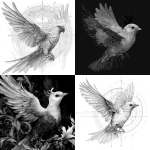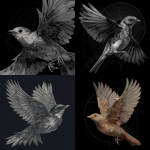Explore the Best AI Image Gallery

The Future of AI Images in Marketing: Transforming Creative Strategies
The advent of artificial intelligence (AI) has revolutionized numerous industries, and marketing stands at the forefront of this technological transformation. Within the realm of marketing, the use of AI-generated images has become an increasingly valuable tool for brands looking to engage consumers in novel ways. This blog post explores the impact of AI images on the creative industry, their potential uses, the ethical considerations involved, and the future trends shaping this exciting landscape.
The Impact of AI Images on the Creative Industry
AI-generated images have democratized creativity, allowing brands of all sizes to produce high-quality visuals without the need for extensive resources. As AI algorithms become more sophisticated, companies can generate images tailored to their specific needs, whether for social media campaigns, websites, or advertisements. This technology not only enhances efficiency but also allows for rapid iteration and experimentation.
Moreover, AI tools such as deep learning and generative adversarial networks (GANs) have enabled marketers to create virtually limitless variations of designs. Organizations can harness these tools to analyze consumer preferences and produce imagery that resonates with target audiences. For instance, AI can assess which visual styles lead to higher engagement rates and generate images that align with this data-driven insight.
Potential Uses of AI Images in Marketing
The potential applications of AI images in marketing are diverse and transformative. Here are several key uses:
- Personalization: AI-generated imagery can be customized to match individual consumer preferences, providing a tailored experience that can significantly enhance engagement.
- Content Generation: Brands can use AI to create dynamic visual content that evolves based on audience interaction, helping maintain freshness and relevance in marketing efforts.
- Social Media Campaigns: With the barrage of content on social media, unique AI-generated images can help brands stand out, optimizing their ads for specific platforms.
- Product Visualization: E-commerce businesses can utilize AI to create stunning product images from various angles and in different contexts, leading to better customer experiences and potentially higher conversion rates.
- Brand Storytelling: AI-generated images can be employed to maintain a visual narrative that aligns with a brand’s identity, creating cohesive messaging across all platforms.
Ethical Considerations
While the benefits of AI in marketing are palpable, ethical concerns must be addressed. Issues surrounding copyright, authenticity, and the potential for misinformation present challenges that marketers need to navigate thoughtfully. As AI images become indistinguishable from those created by humans, questions arise about authorship and intellectual property rights. Who owns an AI-generated image? How do we attribute work created by machines?
Furthermore, the possibility of AI being used to generate misleading or manipulative imagery raises alarm bells. Brands must take care to ensure that their use of AI does not contribute to the proliferation of deceptive practices or undermine consumer trust. Transparency and ethical guidelines are crucial as companies adopt these new technologies to maintain integrity and foster positive relationships with consumers.
Future Trends in AI Images for Marketing
Looking ahead, several trends are emerging that will shape the future of AI-generated images in marketing:
- Increased Integration with User-Generated Content: AI can analyze user-generated content to find patterns that resonate with target audiences, allowing brands to align their imagery with current trends.
- Augmented Reality (AR) Applications: As AR gains traction, the integration of AI-generated images in AR experiences can lead to interactive campaigns that engage consumers at a deeper level.
- Greater Emphasis on Authenticity: As consumers become more discerning, brands will need to blend AI capabilities with authentic storytelling to create relatable content that builds trust.
- Advancements in AI Technology: As AI continues to evolve, the quality and realism of generated images will improve, providing marketers with even more tools to captivate audiences.
- Focus on Sustainability: The promotion of sustainable practices will require new visual narratives that resonate with environmentally conscious consumers, which AI can help create.
In conclusion, AI-generated images represent a revolutionary shift in marketing strategies, enabling brands to innovate, engage, and personalize messaging like never before. While the technology offers immense potential, it is essential to approach its implementation with an awareness of ethical implications. By prioritizing responsible usage and harnessing the power of AI thoughtfully, companies can navigate this exciting new frontier in marketing successfully.
















](https://images.ai-img.art/thumbnails/150/815d563985dccec04e21f9a9fa89f09cadc6693be7c6d8ab87defff2b61d417e.webp)

](https://images.ai-img.art/thumbnails/150/a2e728c4e462bef482c106719df04081c360d4444d4d154c22318725b7bcb124.webp)

](https://images.ai-img.art/thumbnails/150/4a7a4d6bca6b537f112483b9db13c7dfe541bb35fd8a022bdd131714cc60622a.webp)







](https://images.ai-img.art/thumbnails/150/3478bd7a5bba66ae70209eef4f2b09837ef09ca033a7511ea86692824661b0a8.webp)






](https://images.ai-img.art/thumbnails/150/5f48fc91b83cfbe17932638af412d0c3a1649ed43692e334aa8cfb9b653153d0.webp)

](https://images.ai-img.art/thumbnails/150/024a13ae047c60649b5e7b4f5a71cb7e8a0e8838266fedbd1cb342ac1d2e951c.webp)



](https://images.ai-img.art/thumbnails/150/6917eea85c775b7876cfba66dfdcae79d6f026ca442f0dfa77824f5af58cfbb0.webp)


](https://images.ai-img.art/thumbnails/150/bc924c2b4ba958c2aabf177b116f47053317904ae6e56b84db3f7dc2d666c080.webp)




